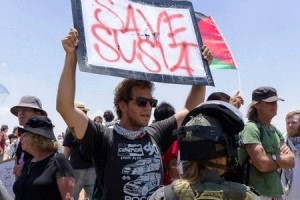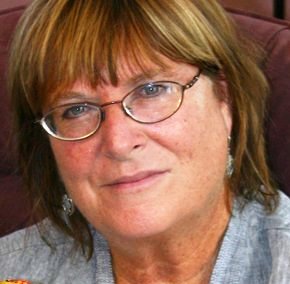The village of Susiya is facing imminent destruction again. It has been demolished six times but its residents stay. They remain rooted in the rocky dry soil. They were expelled from their original village in ’48 and then again for an “archeological site” in ’86 and their caves destroyed in 2011.
Each time their taboon ovens are destroyed along with shelters for their animals. Each time they rebuild. Every night they go to sleep wondering if today will be the day. Each night they go to sleep praying to God for protection and acceptance if what is written is what is written. Each night they choose members of the community to stand watch with some of the internationals who have come to accompany, to be a protective presence, to be witnesses just in case. Each night they descend into a restless uneasy sleep bur rise each morning with the cock crow to begin a new day of feeding the animals, making honey, picking plums, sewing, cooking for their families and stray peacekeepers. They practice resurrection every day.
While they practice living resurrected lives they also live in the shadow of a new cross, the demolition of 34 structures that will leave half of the village homeless including 140 children.
I have preached many times about the important justice task of walking the Via Dolorosa or going to the foot of the cross to be with the crucified ones. It’s holy work and there are many ways to do this. Weeping is one. Wiping the sweat of the brow of the one carrying the cross is another. Shouldering it yourself another.
 And when you have reached Golgotha, the place of the skulls, the question is where are you standing or hanging? Do you recognize Him as the One? Do you ask to be remembered when he comes into the kingdom? Do you need to be saved yourself? Or are you standing at the foot of the cross with the women? Weeping or clutching your oils and myrrh?
And when you have reached Golgotha, the place of the skulls, the question is where are you standing or hanging? Do you recognize Him as the One? Do you ask to be remembered when he comes into the kingdom? Do you need to be saved yourself? Or are you standing at the foot of the cross with the women? Weeping or clutching your oils and myrrh?
I don’t believe we have the right to ask to be saved unless we have recognized Him in the suffering faces of those around us especially those on the margins of our societies—-the poor, the outcast, the soon to be homeless. Why should He remember us if we too have not risked our precious lives, left our cool sanctuaries, doctrines and dogmas? Why should he remember us if we have not seen him in the least of these? In the faces of his children?
And to have the honor to stand in the shadow of the cross? Who gets this privilege?
Those who have tried to dismantle the systems of injustice that lead to cross making—the laws and policies that say it is OK to ethnically cleanse a place. Those who are willing to risk their political capitol for justice, for an indigenous people’s right to stay on their land, stay in their homes. Those who are willing to cross religious and cultural lines. Those who have literally shared the dark nights with those who can’t sleep and the hot days with those waiting.
You come to Susiya or support the cause to save the village because your own salvation story is bound to this salvation story. And where you hang or where you stand makes all the difference.
We stand with those suffering through their time of trial offering what we can, what we have—our tears, our sympathy, our outrage. You can’t come to the foot of the cross just to weep or bury the dead, but you must be prepared for this, too.
You come because you must. You come because to stand there with those who live resurrected lives already is where hope lives. She lives in them and their steadfastness. Your life depends on being close to this.
You come to Susiya or support the cause to save the village because your own salvation story is bound to this salvation story. And where you hang or where you stand makes all the difference.
(Rev. Loren McGrail serves with Global Ministries of the United Church of Christ and Disciples of Christ. She serves with the YWCA of Palestine as their communications and advocacy officer.)














Lenora says
Thank you, Loren for the great article.
Sherrill says
Loren, I made a comment yesterday but my computer swallowed it. Thank you for your voice and prophetic call. I will carry the image of the “resurrected ones”. Peace, Sherrill
Thomas Beilman says
Well and powerfully stated, Reverend McGrail.